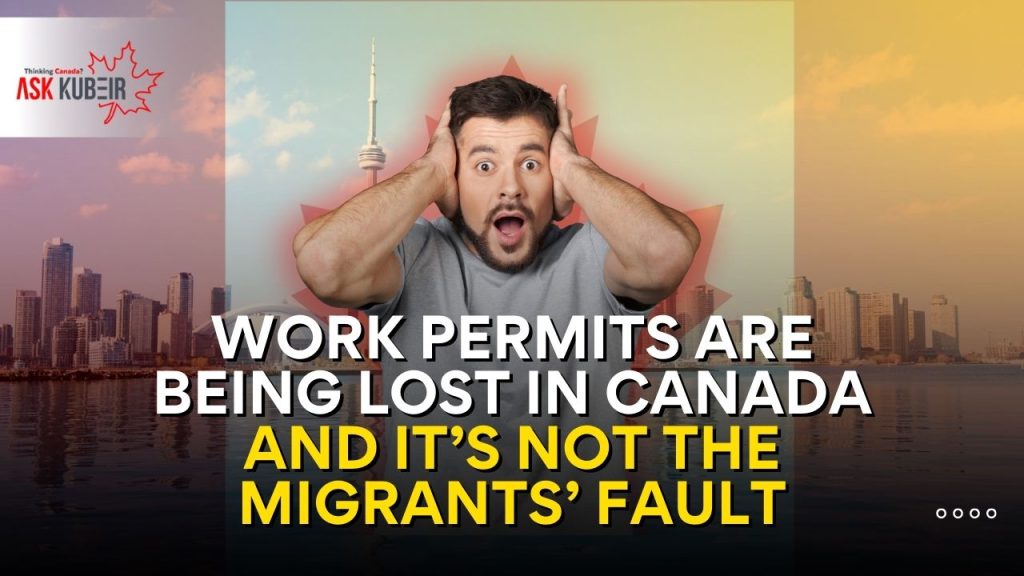
Many migrants in Canada are losing their legal right to work. Not because they broke the rules, but because the immigration system is falling behind. The result? Thousands are left in limbo, struggling without income, healthcare, or security.
What’s Causing the Problem?
Migrants who are working legally in Canada often need to renew their work permits. In many cases, this process depends on something called an LMIA — a Labour Market Impact Assessment. It’s a document that shows no Canadian worker is available for the job, so the employer can hire a foreign worker.
Right now, getting an LMIA is taking over 165 business days. That’s more than seven months. During this time, workers:
- Cannot legally work
- Lose access to provincial healthcare
- Are unable to support themselves or their families
- May lose their legal status in Canada
These delays are not just inconvenient — they can be dangerous.
Real People Are Suffering
In one tragic case, a woman who was pregnant delayed going to the hospital because her work permit had expired. She lost her pregnancy while waiting for immigration to process her file. Stories like this highlight the very real human cost of these delays.
Delays at the Provincial Level Too
It’s not only the federal government causing delays. Some provinces are taking a long time to issue support letters, even though they have the authority to help.
When someone is nominated through a Provincial Nominee Program (PNP), the province can issue a support letter for a work permit, even while the full application is being processed. But many provinces are not using this option quickly enough.
This raises questions about why action isn’t being taken when the tools are available.
What This Tells Us
There are serious concerns that need answers:
- Is this just a case of the system being overburdened?
- Or is it an intentional move to pressure migrants into leaving?
- Why are some provinces taking so long when they have the ability to help?
These migrants followed the rules. Their work permit extensions are lawful. The delay is not their failure — it’s a failure of the system.
When Delays Become Neglect
Long delays can no longer be seen as simple inefficiency. When people lose their jobs, health coverage, or status — and when lives are put at risk — it starts to look like neglect.
This isn’t just a system that’s slow. It’s one that needs urgent attention.

What is an LMIA?
An LMIA (Labour Market Impact Assessment) is a document employers must obtain to hire a foreign worker. It shows no Canadian citizen or permanent resident is available for the job.
What happens if my work permit expires while waiting?
You may lose your legal ability to work and access essential services. This can also impact your immigration status.
Can provinces help during the waiting period?
Yes. Provinces with PNP programs can issue work permit support letters even before the nomination is finalized. Not all provinces are doing this quickly enough.
Why is healthcare affected?
In many provinces, access to public healthcare is tied to having a valid work permit. Once the permit expires, healthcare coverage may be cut off.
What can I do if I’m affected?
- Talk to a licensed immigration consultant
- Contact your local MP or MPP for support
- Raise awareness of your situation to highlight the issue
Final Thoughts
This is not about broken laws or failed applications. It’s about delays that are harming people who have done everything right. These migrants deserve better. They deserve fairness, compassion, and a system that works.
Let us keep the pressure on for a faster, fairer process — because when the system fails, real lives are at stake.

Would you like a consultation to explore your Canadian work options? Contact Ask Kubeir today!
📌 If you believe your VISA application should be showcased in the most favorable light when submitting to immigration, feel free to book our services.
📌 To book an appointment with Kubeir – Licensed Canadian Immigration Consultant, click the “Book Appointment”
📲 You may also reach us at this number for all immigration-related services:
- (+𝟭) 𝟰𝟯𝟳-𝟳𝟳𝟳-𝟯𝟳𝟳𝟳 (Canada)
- +971 45 26 4646 (Dubai)
Disclaimer: This is for informational purposes only and not legal advice. Always consult experts like us or the official IRCC website for up-to-date details.
